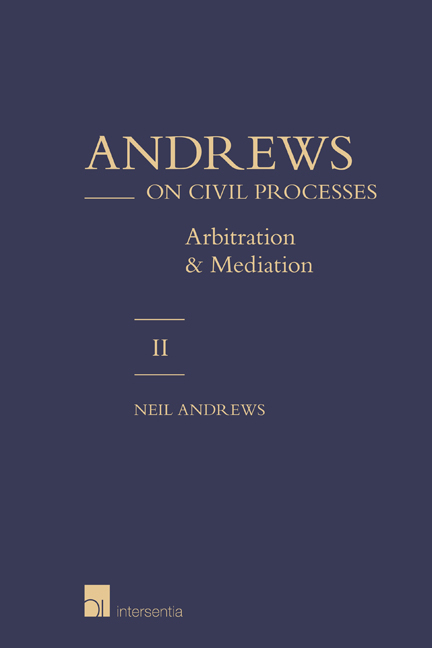Chapter 1 - Mediation
from PART I - MEDIATION
Published online by Cambridge University Press: 13 December 2017
Summary
MEDIATION AND OTHER FORMS OF ALTERNATIVE DISPUTE RESOLUTION
The three main ‘alternatives’ to civil litigation before the English courts are: (i) party-to-party negotiation leading to settlement: this is the most common way in which a dispute or claim is terminated; (ii) mediation or conciliation: these will be discussed in this chapter; (iii) arbitration (see next chapter for this). Arbitration tends to be a rather formal style of proceeding; commercial arbitration conducted in England can replicate many aspects of High Court commercial litigation, although this tendency is regrettable, has been lamented, and should be resisted.
As for (i), party-to-party negotiation, leading to settlement, a few remarks will suffice. Settlement is by far the most common way in which civil disputes truly contested on the merits (that is, claims other than straightforward debt enforcement actions, where there is no real defence) are concluded in England. A very high percentage of civil actions do not proceed to trial. Instead most English actions culminate not in judgment on the merits, following examination of witnesses and documents at trial, or consideration of the merits during a summary proceeding (10.79 ff, vol I), but in an agreement of compromise or settlement between the parties. The decline of civil trials in the USA has also attracted comment.
MAIN TYPES OF INTERVENTION BY A NEUTRAL
A third party neutral can intervene in various ways, as a messenger or go-between, as a more active facilitative mediator, as a prescriptive or ‘evaluative’ mediator, or as a decision-maker (whether as a judge or arbitrator). In greater detail, these roles involve the following:
(i) The neutral might act minimally as a shuttle-cock messenger: the neutral will then be a ‘go-between’, passing messages between parties who cannot any longer communicate directly with each other.
(ii) Or the neutral might intervene more actively as a non-evaluative and facilitative mediator, for the purpose of brokering a settlement, without commenting on the merits of the parties’ respective positions; getting the parties, especially their leading figures, to sit together and articulate their sides of the disagreement might be a major step towards establishing the platform for an eventual settlement.
- Type
- Chapter
- Information
- Andrews on Civil ProcessesArbitration and Mediation, pp. 3 - 64Publisher: IntersentiaPrint publication year: 2013



